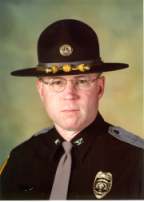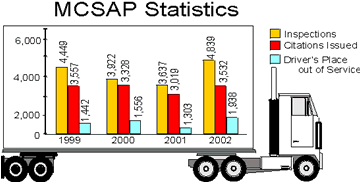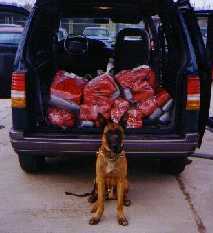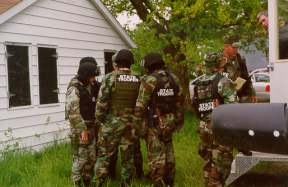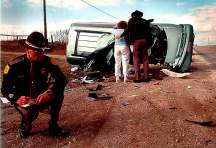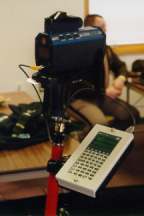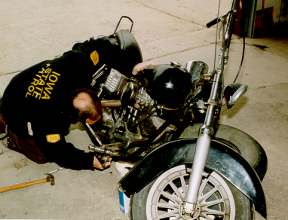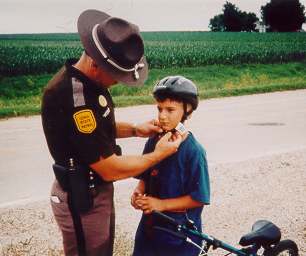 |
 |
 |
 |
The Iowa State Patrol, with 507 dedicated men and women, is the largest division within the Department of Public Safety. There are 407 sworn officers and 100 civilian employees that provide service and protection to the citizens of Iowa and those that visit our state. The duties of the State Patrol are to enforce all motor vehicle laws, investigate traffic accidents occurring on the highways, provide emergency medical care, promote highway safety, and assist local law enforcement agencies when requested. |
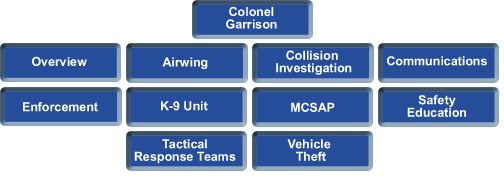
|
|
A member of the Iowa State Patrol for nearly 26 years, Robert O. Garrison was appointed to head the Iowa State Patrol in October of 1999. During his tenure with the State Patrol, Garrison has undertaken a wide variety of assignments. He has served as a Trooper, Assistant District Commander, District Commander, Area Commander, Departmental Training Academy Commander, and Executive Assistant to the Commissioner of Public Safety. Colonel Garrison is the twelfth man to serve as the Chief of the Iowa State Patrol since its inception in 1935. |
| Overview |
| To
enhance the duties associated with its mission of safety and service to
the motoring public on the roads and highways of Iowa, the Patrol has
developed several specialized areas including: Technical Accident Investigation
& Reconstruction, Patrol Airwing, Vehicle Theft Unit, Tactical Response
Teams, Safety Education Officers, and Motor Carrier Safety Assistance
Program. Iowa takes pride in the high level of qualified and dedicated men and women that comprise the officers of the State Patrol. Becoming an Iowa State Trooper requires determination and perseverance. To qualify for acceptance into the Department's peace officer training program, the applicant must meet stringent physical, mental, and moral standards. Once accepted, recruits must successfully complete 20 weeks of intensive physical and scholastic training, then spend three months with a field-training officer. Once they have completed a yearlong probation period, the Trooper is ready to embark on a rewarding career. |
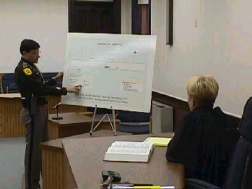 Troopers are often called into court to testify during court proceedings. |
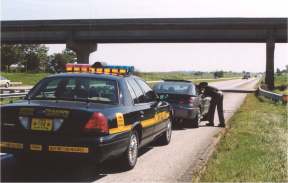 |
A typical day for a trooper can be anything but typical. While their primary responsibilities include patrolling county, state and interstate highways to ensure the safety and well being of travelers, they may be called upon to handle a wide-range of duties. The trooper must always be prepared to respond to any emergency. From removing the alcohol/drug impaired driver from the roadway, or identifying drug traffickers that utilize Iowa's highways, to giving directions to lost motorists, Troopers do a lot more than just write citations. | |
|
The Iowa State Patrol
has many diversified operations including:
|
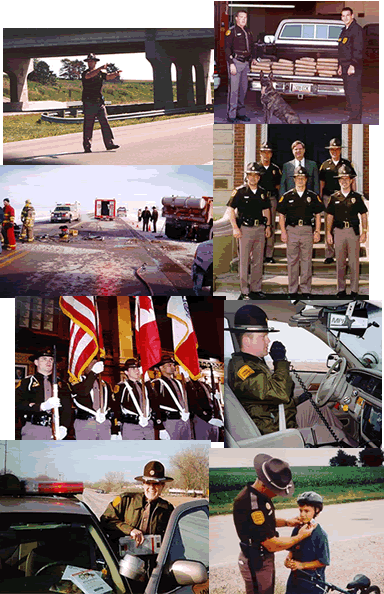 |
|
Every trooper received
updated training on conducting Standardized Field Sobriety Tests to
enhance their ability to recognize the drunk or drugged driver. The Iowa State Patrol, funded by a grant from the Governor's Traffic Safety Bureau, recently utilized a team concept in an attempt to reduce alcohol related fatalaties in Iowa. In April, May and June of 2002, a team of 38 Troopers focused primarily on removing intoxicated drivers from Iowa roadways. During the course of this project, Troopers assigned to this program arrested 569 drivers for operating while intoxicated, an increase of 418 arrests over the same time period in 2001. The extra emphasis resulted in a 53% reduction in alcohol related fatalities from 2001 to 2002 for the months of the project. In addition, Safety Education Officers across the state conducted 145 alcohol related educational programs for high schools during these months - reaching approximately 7,500 Iowa high school students. Much of the enforcement action that Troopers take on the highways does not involve formal charges or arrests. During 2001, Iowa State Troopers issued 165,420 warning memorandums for various minor traffic infractions. An additional 67,582 faulty equipment advisories were issued for things like non-working head or tail lamps on vehicles. Troopers also documented 32,766 incidents in which they provided assistance to a motorist in need on Iowa highways. |
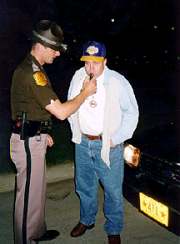 |
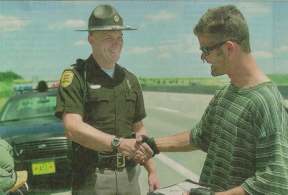 |
Together, these actions represent over a quarter of a million contacts with citizens that can be considered as occurring in the most positive way. If a warning alone can correct a driving or vehicle equipment infraction, Iowa Troopers are more than willing to give this opportunity to a violator without the demands or stigma of formal criminal charges. |
| Motor
Carrier Assistance Program (MCSAP) |
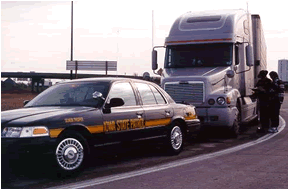 |
The Iowa
State Patrol's Motor Carrier Safety Assistance Program (MCSAP) was created
in 1992. Specially trained MCSAP troopers travel Iowa's roadways identifying
and removing fatigued and impaired commercial motor vehicle operators,
thereby providing a safer environment for the motoring public. Commercial
motor vehicles represent a significant percentage of the miles driven
on our roadways, and the safety and proper operation of these vehicles
is essential. Supported by a core group of thirteen full time troopers, a sergeant and lieutenant coordinator, and administrative support, MCSAP is part of a nationwide program operating under the guidance of the Federal Motor Carrier Safety Administration. Located throughout the state, these officers work the interstate system with an emphasis on identifying fatigued and impaired commercial motor vehicle operators. |
